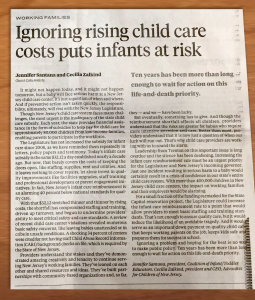Posted on November 10, 2017
Published in The Star-Ledger on Monday, November 6, 2017

It might not happen today, and it might not happen tomorrow, but a baby will face serious harm at a New Jersey child care center. It’s just a question of when and where. And if preventive action isn’t taken quickly, the responsibility, ultimately, will rest with the New Jersey Legislature.
Though New Jersey’s child care system faces many challenges, the most urgent is the inadequacy of the state child care subsidy. Each year, the state provides financial assistance in the form of subsidies to help pay for child care for approximately 80,000 children from low-income families, enabling parents to participate in the workforce.
The Legislature has not increased the subsidy for infant care since 2008, as we have reminded them repeatedly in letters, policy papers and testimony. Today’s infant care subsidy is the same $32.12 a day established nearly a decade ago. But now, that barely covers the costs of keeping the doors open, like staffing, supplies, rent and utilities. And it leaves nothing to cover repairs, let alone invest in quality improvements like facilities upgrades, staff training and professional development or parent engagement initiatives. In fact, New Jersey’s infant care reimbursement is an alarming 40 percent below national standards for quality care.
With that $32.12 stretched thinner and thinner by rising costs, the shortfall has compromised staffing and training, driven up turnover, and begun to undermine providers’ ability to meet critical safety and care standards. A review of recent child care center violations revealed numerous basic safety concerns, like leaving babies unattended or in cribs in unsafe conditions. A shocking 34 percent of centers were cited for not having staff Child Abuse Record Information (CARI) background checks on file, which is required by the State of New Jersey.
Providers understand the stakes and they’ve demonstrated amazing creativity and tenacity to continue serving New Jersey’s working families. They’ve leaned on each other and shared resources and ideas. They’ve built partnerships with community-based organizations and, so far, they – and we – have been lucky.
But eventually, something has to give. And though the reimbursement shortfall affects all children, providers understand that the risks are greater for babies who require more intensive attention and care. Better than most, providers understand that it is now just a question of when our luck will run out. That’s why child care providers are working with us to sound the alarm.
Leadership from Trenton on this important issue is long overdue and the silence has been deafening. Increasing the infant care reimbursement rate must be an urgent priority for the Legislature and New Jersey’s incoming governor. Just one incident resulting in serious harm to a baby would certainly result in a crisis of confidence in our state’s entire child care system. With more than 400,000 children in New Jersey child care centers, the impact on working families and their employers would be alarming.
For a small fraction of the funding earmarked for the State Capitol renovation project, the Legislature could increase the infant care reimbursement rate to a point that would allow providers to meet basic staffing and training standards. That’s not enough to ensure quality care, but it would reduce the likelihood of an avoidable tragedy. And it would serve as an important down payment on quality child care that keeps working parents on the job, keeps kids safe and prepares them for success in school.
Ignoring a problem and hoping for the best is no way to make public policy. Ten years has been more than long enough to wait for action on this life-and-death priority.
Jennifer Santana, President, Coalition of Infant/Toddler Educators
Cecilia Zalkind, President and CEO, Advocates for Children of New Jersey

